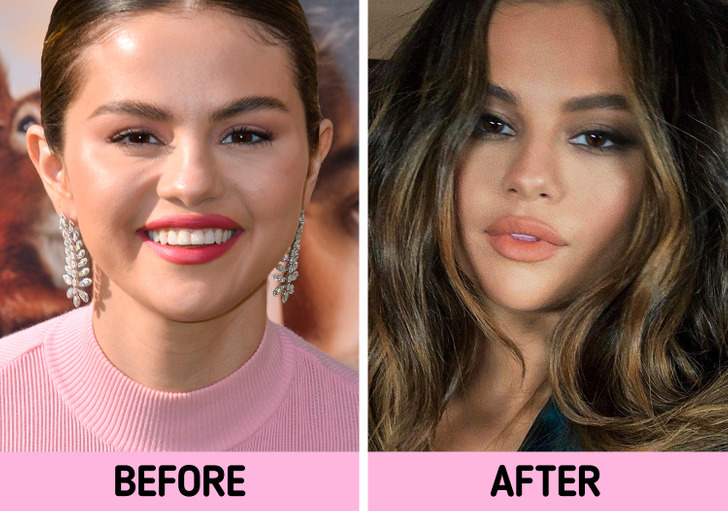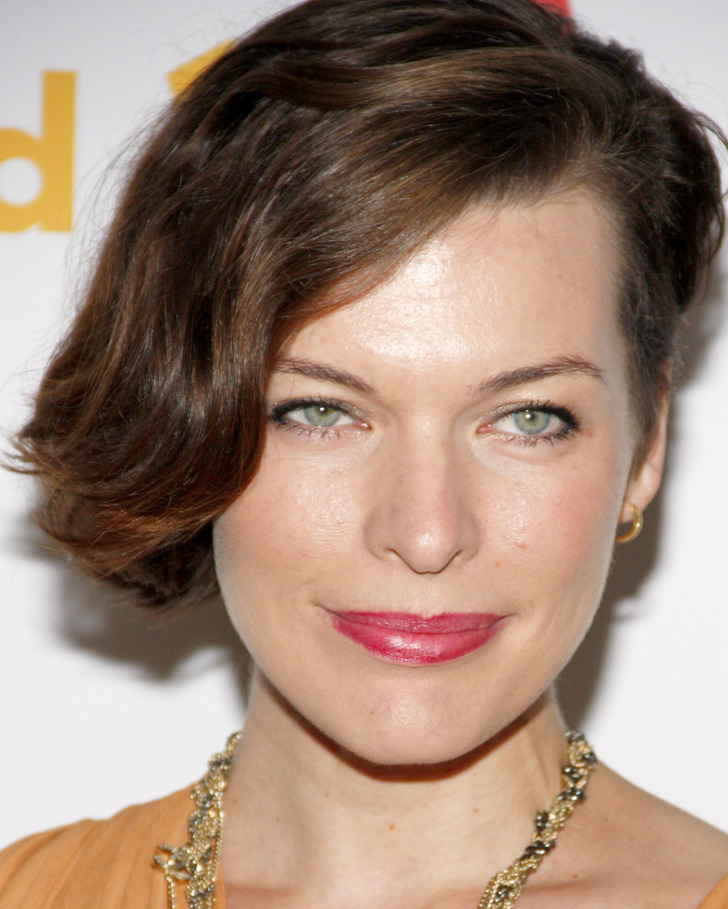Small eyes are considered to be attractive, round faces give us a youthful look, and people with big ears are adorable, just look at Anne Hathaway! There are so many unique features out there that give us our own special charm.
Some people, however, want to fix these things anyway. That’s their choice, but we hope they keep in mind that they can actually do it without surgery. All they need to do is change their hairstyle.
1. Double chin

Cropped haircuts are a big no-no if you have a double chin. Instead, go for bangs and curls, layered, or face-framing haircuts. This way, you’ll draw attention to your hair and not your chin.
Remember that having layers is the trick. They add volume and give the illusion of a narrow face. For short haircut lovers out there, opt for a layered chin-length bob cut, but make sure to keep the ends unevenly cut.
2. Big nose

Choose hairstyles that widen your face so that your nose looks smaller. Different types of bangs do a great job: side-swept, curtain, or layered. You can do your hair up in a messy bun or a ponytail, letting a few strands fall on your head. Try to stay away from short and straight cuts.
3. Big forehead

Bobs with bangs, long or short hair with a central part, or razored bangs look great on people with big foreheads. According to a stylist, horizontal framing, lots of volume, and soft layers are the keys to balancing it all out.
4. Small eyes

Avoid blunt and thick haircuts and focus instead on short hairstyles or low-volume cuts. Bangs are okay, but as long as they don’t cover your eyes and forehead completely. Pixie haircuts accentuate eyes, especially if your eyebrows can be seen well.
5. Round face

Those who want to make their face appear more oval should definitely go for a shaggy wavy bob or face-framing balayage highlights. You can also add more volume on top and leave elongated locks by the sides. Stay away from sleek hairstyles and thick bangs, since horizontal lines will widen your face.
6. Oblong face

People with thin faces have more prominent noses, chins, and necks, and some haircuts can make their faces look even longer. Straight and long hair is a no, while hairstyles that add lots of volume are always welcome. Try a parted shaggy lob, an asymmetrical choppy lob, wispy-layered long hair, or a long wavy center-parted hairstyle.
7. Big ears

It’s not hard to cover ears, yet, it might be challenging to choose only one haircut out of all this diversity. Make sure there’s enough volume and fullness at the sides of your head, and let the hair stand away from the scalp a little bit. Bob haircuts or long and layered hair are a great choice.
How long have you had your current haircut? How easy is it for you to change it?
Preview photo credit TanyaLovus / Shutterstock.com, Valeriia Kogan / Unsplash.com
76-year-old Susan Sarandon criticized for her clothing – has the perfect response for haters

Celebrity and trailblazer Susan Sarandon has never been afraid to speak her truth, both in front of and behind the camera. Over the course of her decades-long career, she has won hearts with her unshakable sincerity and enthralled audiences with her talent.
Sarandon has had a lasting impact on the movie business, from her legendary part in “The Rocky Horror Picture Show” to her Oscar-winning performance in “Dead Man Walking.” She stands out, nevertheless, for reasons more than merely her skill as an actor: she embraces self-expression without hesitation.
Sarandon defies expectations in a field where rigid beauty and conformity standards are frequently the rule. Recently, Sarandon responded in her signature nonverbal way to critics who called her wardrobe choices “inappropriate.”
Rather than exchanging barbs with others, Sarandon let an image do the talking. She effectively silenced her critics by posting a picture of herself showing off her body in nothing but underwear and claiming the freedom to set her own boundaries for what is acceptable.

However, Sarandon’s disobedience goes beyond the world of style. At seventy-six, she ages gracefully and wisely, appreciating the value of time and the meaninglessness of social conventions. How does she keep looking so young? a healthy diet, frequent exercise, a lot of laughter, and, of course, an amazing makeup and hair team.
However, beneath the glitz and recognition is a lady who isn’t scared to follow her own path. Sarandon refuses to squander energy on life’s little pleasures and surrounds herself with others who possess the same boldness, curiosity, and vitality.

Susan Sarandon is a living example of the strength of perseverance and self-assurance in a society that frequently aims to limit and belittle people. She exhorts us all to accept our genuine selves and forge our own pathways in spite of the doubters because she personifies the spirit of defiance.
In addition to honoring Sarandon’s indomitable spirit, let’s take her lead by daring to be unabashedly ourselves and choosing authenticity above conformity. Susan Sarandon’s message is loud and clear in a world that frequently tries to suppress individuality: be brave, fearless, and most importantly, stay true to who you are.



Leave a Reply